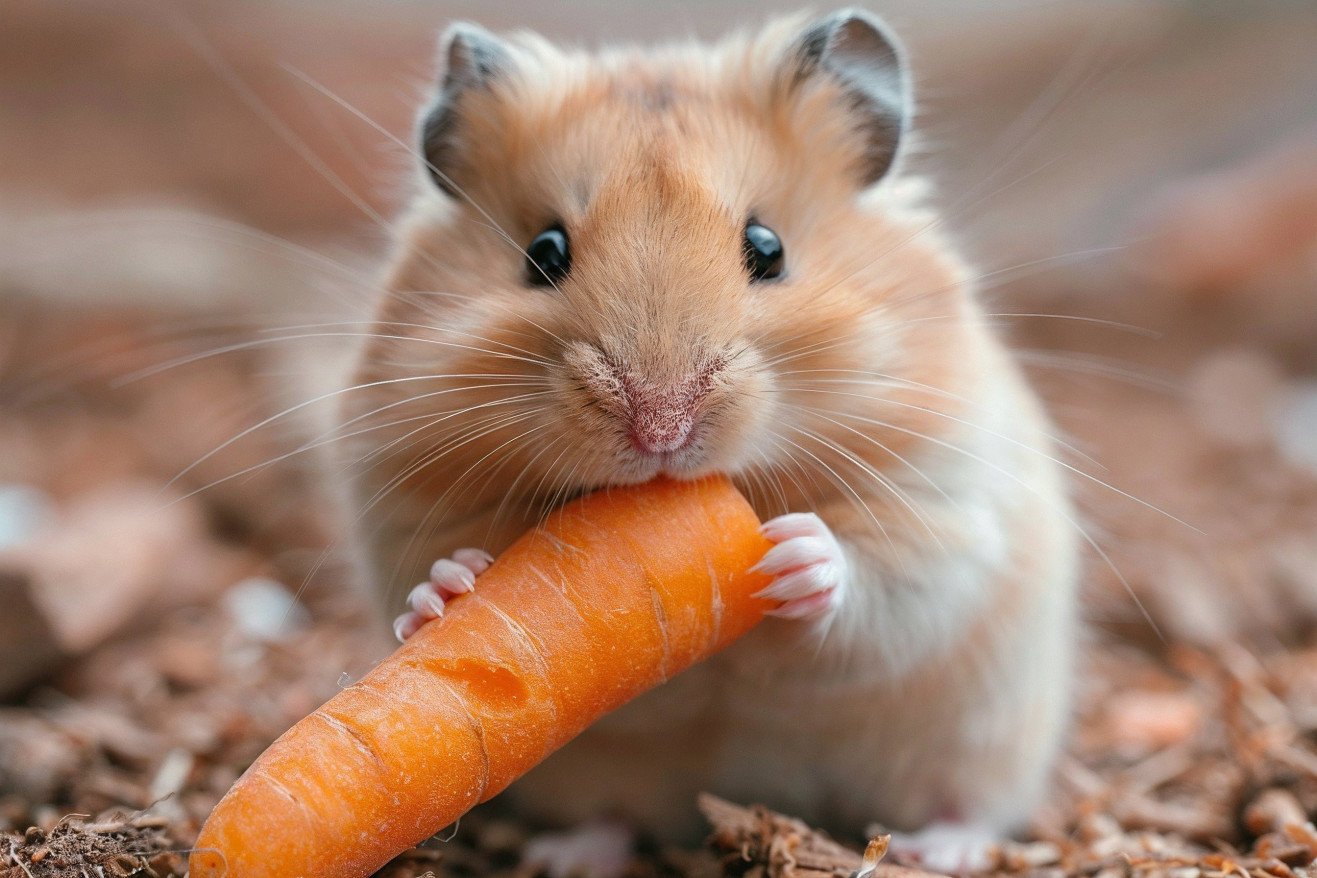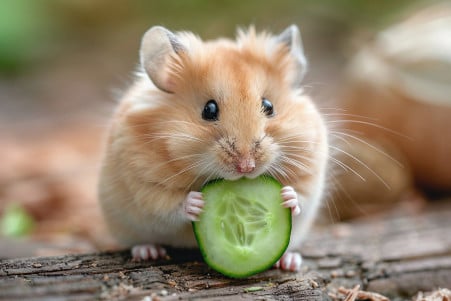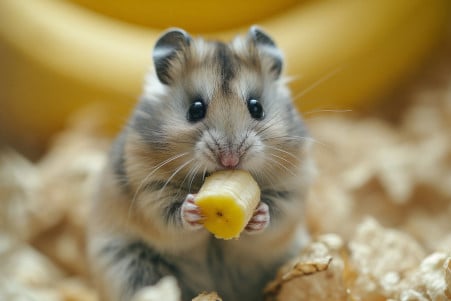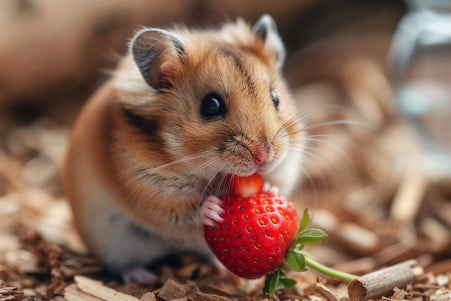Can Hamsters Eat Carrots? A Guide to Safe Snacking
8 March 2024 • Updated 7 March 2024

Carrots are a healthy and delicious snack, but do they have the right nutritional makeup to meet a hamster’s dietary needs? The answer is yes, hamsters can eat carrots in moderation. Carrots have a lot of nutrients that can be good for hamsters, but they are high in sugar, so they should be considered a treat. Make sure to introduce carrots to your hamster’s diet slowly to avoid any tummy upset.
In this deep dive, we’ll look at the world of veterinary nutrition and small pet care science to find out what effect carrots have on a hamster’s well-being. We’ll also look at some research to determine what a hamster’s nutritional needs are and weigh the pros and cons of adding carrots to their diet.
By the end of this article, you’ll understand the importance of the balance needed to keep your hamster healthy, and you’ll have the information you need to know how much is too much and how to keep your hamster’s diet diverse.
Can hamsters eat carrots?
How Do Hamsters Digest Carrots and Other Foods?
The hamster’s digestive system is well-suited to process a range of foods, including plant matter. Zooplus Magazine explains that hamsters’ sharp incisors and molars allow them to chew and grind their food, which is then further broken down by the enzymes in their saliva.
Hamsters have a two-part stomach, with the foregut serving as a storage area and the glandular stomach serving as the site of digestion. As omnivores, hamsters can digest grains well, a fact that has been observed in studies of rodent nutrition.
One of the most unusual aspects of hamster digestion is coprophagy, the practice of eating their own feces to extract more nutrients from the food as it passes through their digestive system a second time, as Science World explains. This is important because the bacteria in their gut are responsible for breaking down cellulose, which is necessary for extracting the nutrients from plant-based foods like carrots.
Hamsters also have a digestive characteristic called foregut fermentation and can metabolize oxalates, which are found in many vegetables. This is discussed in a study by Kerrin Grant, who explains that this is similar to the process in ruminants and allows hamsters to extract calcium from foods that would be toxic to other animals because of the presence of soluble oxalates.
Knowing these details about hamster digestion can help us make sure that we’re feeding them foods like carrots in a way that’s safe and healthy. It’s important to know that they can digest cellulose and that they can extract more nutrients from their food through coprophagy, so that we can make sure that the treats we give them, like carrots, don’t throw off their carefully balanced nutrition or digestive processes.
How Many Carrots Can Hamsters Eat?
Carrots are a great source of many vitamins, minerals, and antioxidants that can help contribute to a hamster’s overall health. They are especially high in beta-carotene, which is converted to vitamin A in the body. Vitamin A is important for maintaining a healthy immune system and helping the body heal wounds. Carrots also contain vitamin K, calcium, and phosphorus, which can help support bone health in hamsters, according to Medical News Today.
Carrots are also high in fiber, which is important for keeping a hamster’s digestive system running smoothly. According to Healthline, the soluble fiber in carrots, especially pectin, can help with digestion and even help with weight loss in these animals. In addition, the American Journal of Clinical Nutrition reports that the antioxidants in carrots, including lutein and zeaxanthin, can help protect a hamster’s eyes.
That said, Healthline warns that carrots should be fed in moderation because they are also high in sugar. While the natural sugars in carrots have a lower glycemic index than the sugars in many other foods, which makes them less of a concern for hamsters than for humans, it’s still important to make sure they don’t eat too many carrots.
By making sure that carrots are just one part of a balanced diet, hamsters can get all of the benefits of this nutritious food without overdoing it on the sugar.
Finding the Sweet Spot: Everything in Moderation for Hamsters and Carrots
While carrots can be a good treat for hamsters in small amounts, it is important to consider the sugar that they contain. A study from the Columbia University Irving Medical Center showed that dietary sugar can change the gut microbiome, leading to obesity and metabolic diseases like diabetes. This is especially important for hamsters, who are small animals that need to be carefully managed to avoid these health problems.
Another thing to consider is the possibility of digestive issues when feeding your hamster carrots. If you give your hamster too many carrots too quickly, it can lead to digestive issues because hamsters have sensitive digestive systems. In addition, too much sugar can lead to dental problems, which is especially important to avoid in hamsters since they need to keep their teeth healthy and filed down.
To avoid these problems, make sure to introduce carrots to your hamster slowly and in moderation. Start by giving them small pieces of carrot so that their gut microbiota can adjust without causing them any issues.
It’s also important to make sure that you are watching for any signs of discomfort or health issues. By doing this, you can make sure that you and your hamster can enjoy the benefits of carrots as a healthy treat while making sure that your hamster stays healthy and happy.
Creating a Well-Balanced Diet for Your Hamster
When it comes to the nutritional well-being of hamsters, the key is in the balance of nutrients. According to UK Pet Food, hamsters are omnivores and need a diet that includes a mix of grains, seeds, proteins, and the occasional vegetable treat.
The best nutritional profile for these animals includes a balance of proteins, fats, and carbohydrates to keep up with their active lifestyles. Proteins are needed for growth and repair, fats are a source of energy, and carbohydrates are the body’s primary source of energy.
Vitamins and minerals are also important for hamsters to stay healthy. According to the NCBI Bookshelf, these nutrients help with everything from bone growth to skin and coat health. Hamsters need a diet that provides the right amount of calories without leading to obesity or malnutrition.
PetHelpful notes that adding carrots as an occasional treat can help add some variety and nutrients to your hamster’s diet. That said, it’s important to make sure that you’re only giving your hamster carrots as a treat and not as a replacement for their complete nutritional diet from pellets.
By making sure that you’re feeding your hamster a well-balanced diet that includes the occasional treat of carrots, you can make sure that they’re getting all of the nutrients that they need to live a long, healthy life.
How to Add Carrots to Your Hamster’s Diet
If you want to make sure that your hamster can enjoy the benefits of carrots without any of the potential downsides, you can add them to your hamster’s diet in a few different ways.
To start, you can give your hamster a small piece of carrot—no larger than a cubic centimeter—once a week, according to We’re All About Pets. This will give your hamster just a few bites of the carrot and allow them to enjoy it as a treat without overloading them with sugar.
You should also watch your hamster for any signs of digestive distress, like diarrhea or changes in the consistency of their stool, especially after the first few times you give them carrots. If you notice any changes in your hamster’s eating habits or digestive issues, the RSPCA recommends that you contact your vet.
After your hamster has gotten used to eating carrots, you can continue to give them this treat once a week, but make sure that you don’t give them any other sugary treats on the same day. Remember that a hamster’s diet should be based on pelleted food, according to PetMD, with carrots and other vegetables as a supplement.
By adding carrots to your hamster’s diet in a thoughtful way, you can help increase the variety and enjoyment of their meals, which can help ensure that you have a happy and healthy pet.
Conclusion: Hamsters and Carrots
In conclusion of our carrot-filled exploration, it’s clear that carrots can be a good addition to a hamster’s diet as long as they are fed in moderation. Carrots are full of vitamins, minerals, and fiber, which can help boost immune and digestive systems. However, because of the sugar in carrots, it’s important to use caution because overeating can lead to obesity, diabetes, and dental issues.
We’ve discussed the unique qualities of a hamster’s digestive system, which is well-equipped to handle a variety of foods, including the occasional carrot. However, we’ve also talked about the importance of slowly introducing carrots to avoid digestive upset. A healthy hamster diet is based on a pelleted food, with carrots and other veggies as a supplement.
In the end, let’s reiterate the importance of responsible pet ownership by making informed and thoughtful dietary decisions. By knowing and respecting the dietary needs and limitations of our pets, we can make sure they are healthy and happy. After all, the key to a healthy hamster diet is variety, moderation, and close observation—a small step for us, but a big step for hamster-kind.


